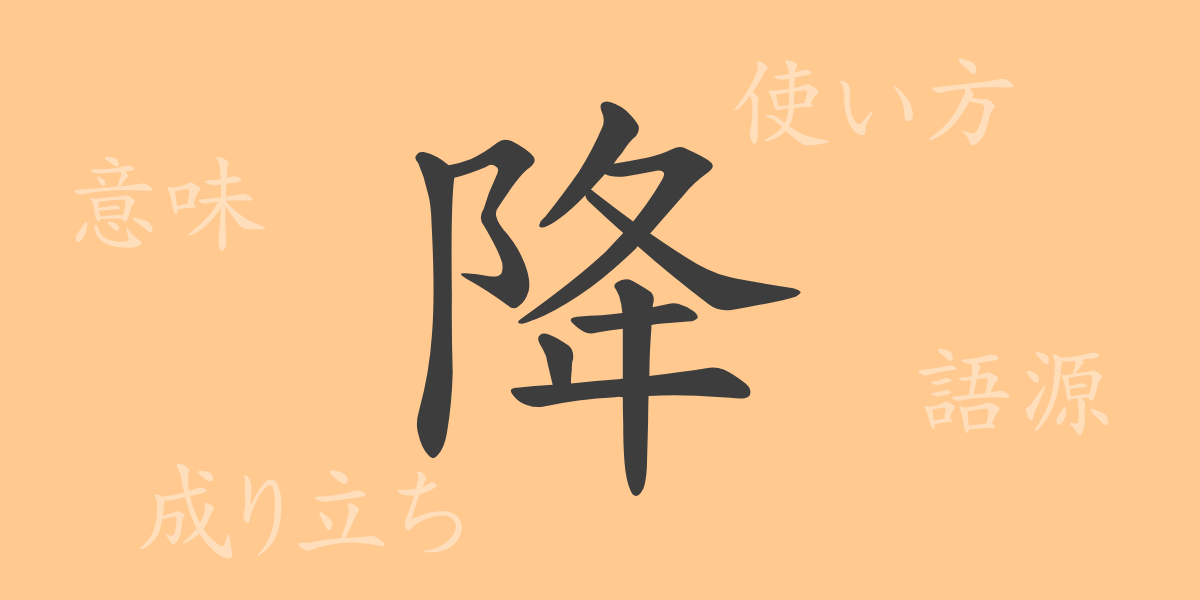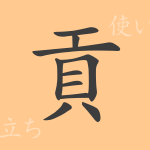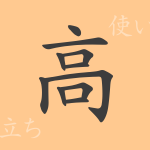Japanese culture is deeply rooted in its delicate and rich language. Kanji form the core of this language and are indispensable elements of daily communication for the Japanese people. Today, we will focus on one of the commonly used kanji, “降(こう),” exploring its origins, meanings, usages, and the rich world of expressions it offers. By understanding this kanji, which is closely tied to our lives through expressions like “rain falling” and “surrendering,” we can also appreciate the cultural and emotional contexts behind the words.
Origin of 降(こう)
The kanji “降(こう)” has its origins in ancient China. It combines “雨(あめ)” (rain), representing the falling of rain from the sky, and “丂(こう),” which indicates a downward movement. This combination symbolically expresses the concept of something moving from above to below. Thus, “降(こう)” visually captures the idea of downward movement, with its fundamental meaning being the action of descending or something moving downward.
Meaning and Usage of 降(こう)
The kanji “降(こう)” primarily denotes movements such as “to descend,” “to lower,” or “to go down.” It is used not only for physical movements but also for abstract concepts. For instance, “降伏(こうふく)” means to surrender or yield in a conflict, while “降格(こうかく)” refers to a demotion in rank or status. In this way, “降(こう)” expands its meanings in various contexts, enriching the range of expressions in the Japanese language.
Readings, Stroke Count, and Radical of 降(こう)
The kanji “降(こう)” has multiple readings and specific structural attributes.
- Readings: On-yomi (Chinese reading) is “コウ(こう),” and kun-yomi (Japanese reading) includes “お.りる(おりる),” “お.ろす(おろす),” “ふ.る(ふる),” and “ふ.り(ふり).”
- Stroke count: The kanji “降(こう)” has 10 strokes.
- Radical: The radical of this kanji is “⻖” (こざとへん).
Idioms, Phrases, and Proverbs Using 降(こう)
Many idioms, phrases, and proverbs in Japanese include the kanji “降(こう).” Here are a few examples:
- 降水量(こうすいりょう): The amount of precipitation (rain, snow, etc.).
- 降参(こうさん): To admit defeat and submit to an opponent.
- 降板(こうばん): To step down from an assigned role.
- 天降る(あまくだる): Originally meaning the descent of gods from the heavens, now often used to describe unexpected good fortune.
- 降って湧いたよう(ふってわいたよう): An idiom describing something that happens suddenly or unexpectedly.
Conclusion on 降(こう)
The kanji “降(こう)” plays a crucial role in Japanese expressions due to its simple yet profound meaning. It is used in various contexts, from natural phenomena to societal actions, enriching our language through its diverse applications. Through this exploration, you have gained a deeper understanding of the multifaceted nature of “降(こう)” and can appreciate the enhanced linguistic awareness it brings.

























